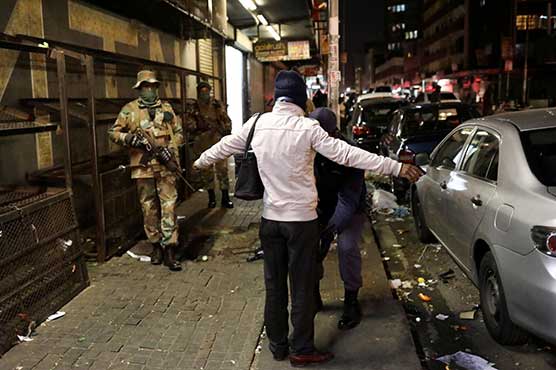S.Africa COVID-19 cases set to reach 300,000 despite early lockdown

The government later eased many curbs over fears for its struggling economy.
JOHANNESBURG (Reuters) - South Africa s cases of COVID-19 were set to reach 300,000 on Wednesday, the most in Africa and in the top 10 in the world, despite a swiftly imposed lockdown aimed at preventing infections spiralling as they did in the West.
Africa s most industrialised nation has 298,292 cases at the last count, and with positive tests now increasing at a rate of more than 10,000 a day, it is all but certain to vault over the 300,000 mark when the ministry releases nightly figures on Wednesday.
At the end of March, President Cyril Ramaphosa took aggressive, early action, shutting shops, ordering people to stay at home and sending the army on to the streets to enforce it - when South Africa had only 400 cases and no recorded deaths.
The government later eased many curbs over fears for its struggling economy.
But with the world s fourth-largest daily increase in coronavirus cases in a country of 58 million people, an exasperated Ramaphosa on Sunday reimposed an alcohol ban and a night curfew.
"South Africa went into lockdown ... so early, (it looked) ... really impressive," said Charles Robertson, a senior economist at Renaissance Capital, who has been closely tracking the coronavirus.
"What became clear is that lockdowns don t work in low-income countries," he said. "In informal economies, (people) ... can t afford to stay at home."
About half of South Africans live in poverty, and about a third are unemployed - some 3 million have lost their jobs since the lockdown began, according to a study by South Africa s Coronavirus Rapid Mobile Survey (CRAM) released on Tuesday.
In many parts of the country, COVID-19 wards are packed, so patients are spilling out into other bits of hospitals and into tents outside, health officials say.
"The storm that we have consistently warned South Africans about is now arriving," Health Minister Zweli Mkhize told parliament.
At just 4,346 deaths, barely 1.5% of cases have proved fatal so far, in part because of a young population. That will rise as shortages of oxygen and hospital beds worsen. Ramaphosa said scientists had predicted up to 50,000 deaths.
"We are seeing a system that s under pressure, not under disaster collapse ... But it s taking a huge strain," Charl van Loggerenberg, head of emergency medicine at Life Healthcare, which has private hospitals treating COVID patients across the country, told Reuters.
At public hospitals, which were struggling with capacity anyway, medics have complained about a lack of staff and protective equipment.
"Not enough health workers have been hired, our requests for PPE have been ignored, guidelines are not being followed," said Sibongiseni Delihlazo, spokesman for the main nurses union.
Gauteng, the province at the epicentre and home to the biggest city, Johannesburg, is adding beds, setting up field hospitals, and boosting numbers of medical workers, said Kwara Kekana, a spokeswoman for the provincial health department.

